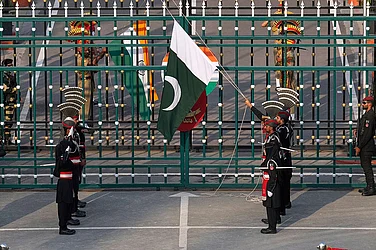Humour and economics seem incongruous. Not so, when Prof Jagdish N Bhagwati of Columbia University took the mike at the Madhavrao Scindia Memorial Lecture in Delhi. The renowned economist delivered an anecdote-laden lecture on the state of economy. Or, more precisely, India under Prime Minister Narendra Modi's leadership.
He addrssed an audience that had several Congress leaders, including former Prime Minister Manmohan Singh, former finance minister P. Chidambaram, former Delhi chief minister Shiela Dikshit and many other senior leaders. That's why perhaps Bhagwati made it known that he has been a Congress supporter and not a follower of the ruling BJP, as is widely believed.
If Bhagwati in his lecture titled "The Cusp of Change" gave due credit to Manmohan Singh, his friend of 60 years, for being a major mover of India's first economic revolution in 1991, he also made no bones about his faith in Prime Minister Modi to deliver the promised second economic revolution by ushering reforms at a far faster pace than has been witnessed so far.
Here are eleven major takes from his lecture:
- If Modi has been known to be hasty in taking some contentious decisions or stance as at the WTO negotiations, he has also shown flexibility in changing his stance on the advice of experts, economists like Bhagwati or bureaucrats.
- India should be willing to adopt new agriculture/seed technology, else the country's ability to undertake major revolution in productivity will be compromised and with it the ability to meet the challenges of poverty.
- India should bring to the forefront education and science, just as our first prime minister JawaharLal Nehru had done, and encourage research and adoption of new technologies to improve productivity.
- India will be able to better deliver on the promised equitable development, not through rights based social development but by creating gainful employment and better utilization of resources to improve socio-economic infrastructure like education and healthcare.
- Once the people's expectations are aroused through a process of liberal democracy – NGOs, the opposition, independent media and judiciary – in varied permutations in different parts of the country, then the level of political discourse and engagement will go up.
- Defending the Gujarat model of development being pursued by Modi, Bhagwati said the philosophy behind it is not just creating prosperity and pulling people into gainful employment but also raising resources for social development on the lines advocated by Swami Vivekanand.
- Bhagwati emphasised that while track one of reforms was about raising economic growth, the track two is about spending the resources to create additional effects for the poor. Bhagwati pointed out that unlike fellow economist Amartya Sen, he does not believe that only public sector should be utilised to spend public funds to render services like better education and health facilities.
- The quarrel is not about economic growth numbers or targets but policies, stated Bhagwati, adding that he favoured Planning Commission for being very target oriented.
- Bhagwati was willing to bet that in two to three years time, Modi team would have a rethink on multi-brand retail as the NDA widens its support base beyond the merchant trade, the traditional support group of BJP.
- On the ordinance route adopted by the government to pursue reforms, Bhagwati was categorical that while this executive action is perfectly legal, it faces risk of being overturned. Further like corruption, it corrodes your (parliamentary) system.
- Bhagwati had no suggestions or wish list to offer on the next budget stating that if he were to be offered the finance minister's job, "I would leave the country".
















